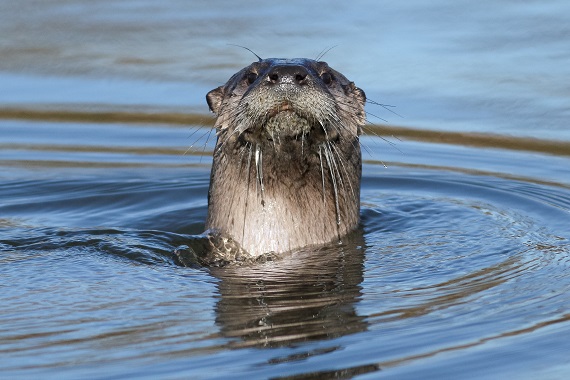
The North American river otter (Lontra canadensis), also called the Canadian otter, is the most abundant species of otter. They are found throughout most of North America – from the Rio Grande in Northern Mexico to Canada and Alaska. They live in riparian zones, which are the areas that border stream, rivers, and lakes. Their habitats can be both marine and freshwater. River otters have brown or grey fur on top with a lighter underside. They have dense short underfur, which is covered by darker, coarse hairs that help to repel water. These otters have muscular and streamlined bodies, short legs, and webbed feet with non-retractable claws. They have small heads, with long necks and shoulders. River otters also have flattened, muscular tails, which make up approximately 40% of the otter’s total body length. Due to their webbed feet and muscular tails, it comes as no surprise that river otters are excellent swimmers. Their webbed feet and muscular tail help them to move quickly through the water. As they dive underwater, they close their ears and nostrils to keep water out. They can stay underwater for up to four minutes. North American river otters tend to live alone or in pairs. Their home range can be as large as 30 square miles (78 square kilometers), but usually, their territory is much smaller, between 3 and 15 square miles (4.8 to 24 square kilometers). They mark their territory by urinating, defecating, scratching, and rubbing their scent glands on rocks and trees. Their home range shrinks during breeding and rearing season. Although they live alone or in pairs, these otters often socialize in groups and are known for their playful behavior. This playful behavior is not only social but teaches otters several survival skills. These skills include hunting and fighting. River otters are nocturnal hunters. They eat mostly aquatic organisms such as frogs, fish, turtles, insects, and some small mammals. They generally forage in the water, but they can also hunt on land. Sometimes river otters will travel between 10 and 18 miles (16 and 29 km) in search of food. They hunt either alone or in pairs. River otters make dens along the water in empty holes or abandoned burrows. The dens have entrances underwater so that they can be reached from the water. They breed in late winter to early spring, and the females give birth to between one and three pups. The pups are blind and helpless when born. The female is responsible for rearing the pups. After two months, the pups learn to swim. The female gives them a helping hand by pushing them from the den into the water! The pups are quick to learn, though, and are happily swimming in no time. River otters are prey for bobcats, alligators, coyotes, raptors, and other large predators. They are also threatened by habitat loss and pollution that has occurred since European’s colonized North America. Several groups have been set up to try to help conserve natural populations. River otters are underwater acrobats that are known for their social and playful behavior and have been observed sliding down slippery slopes for fun. The aquatic mammals have several biological adaptations that have enabled them to inhabit several environments successfully. Let’s take a closer look.
Kingdom
Animalia
Phylum
Chordata
Class
Mammalia
Order
Carnivora
Family
Mustelidae
Genus
Lontra
Species
Lontra canadensis
Length
2.5 to 5 feet (76 to 152 centimeters)
Weight
10 to 33 pounds (4.5 to 15 kilograms)
Lifespan
The average lifespan is 12 years; the oldest river otter recorded was 27
Social Structure
Solitary or in pairs
Status
Least Concern
Habitat
Riparian zones
Average litter size
2 – 4
Main food item
Fish, invertebrates, amphibians, small mammals
Main predators
Bobcats, alligators, coyotes, raptors, and other large predators.
The Basics

Fun Facts about River Otters
Thermoregulation and Metabolic Rate


